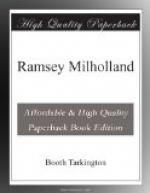“I guess so, Grandpa.”
“Well, I think it was mostly because we were certain that we were right.”
“I see,” said Ramsey. “The Rebels knew they were on the side of the Devil.” But at this, the grandfather’s laugh was louder than it had been before, and Ramsey looked hurt. “Well, you can laugh if you want to!” he objected in an aggrieved voice. “Anyway, the Sunday-school sup’intendent told us when people knew they were on the Devil’s side they always—”
“I dare say, I dare say,” the old man interrupted, a little impatiently. “But in this world mighty few people think they’re on the Devil’s side, Ramsey. There was a Frenchman once, in olden times; he said people were crazy because, though they couldn’t even make worms, they believed they could make gods. And so whenever countries or parts of a country get into a war, each side makes a god and a devil, and says: ’God’s on our side and the Devil’s on the other.’ The South thought the Devil was on our side, you see.”
“Well, that kind o’ mixes it all up more’n ever.”
“Yes, it seems so; but Abraham Lincoln wasn’t mixed up about it. When some people told him that God was on our side, he said the important thing was to find out if we were on God’s side. That was the whole question, you see; because either side could make up a god, the kind of a god they liked and wanted; and then they’d believe in him, too, and fight for him—but if he was only a made-up god they’d lose. President Lincoln didn’t want to have a made-up god on his side; he wanted to find God Himself and find out what he wanted, and then do it. And that’s what Lincoln did.”
“Well, I don’t understand much of all that!”
“No? Then suppose you look at it this way: The South was fighting for what it believed to be its rights, but we weren’t fighting for our rights; we were fighting for the right. The South was fighting for what it believed to be its right to split the Union and be a country by itself; but we were fighting for ’Liberty and Union, now and forever, one and inseparable.’ It wasn’t only the Union we fought for; it was Freedom. The South wanted freedom to leave the Union; but the reason the South wanted that freedom to separate from us was because we wanted the Freedom of Man. There’s the reason we had the certain knowledge that we were going to win the war. How plain and simple it is!”
Ramsey didn’t think so. He had begun to feel bored by the conversation, and to undergo the oppression he usually suffered in school; yet he took a little interest in the inexplicable increase of fervour with which his grandfather spoke, and in a shoot of sunshine which somehow got through the foliage of the walnut tree and made a bedazzlement of glinting fine lines in one spot, about the size of a saucer, upon the old man’s head of thick white hair. Half closing his eyes, drowsily, Ramsey played that this sunshine spot was a white bird’s-next and, and he had a momentary half dream of a glittering little bird that dwelt there and wore a blue soldier cap on its head. The earnest old voice of the veteran was only a sound in the boy’s ears.




